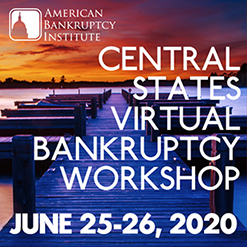| |
| |
| vol 19, num 1 | June 2020 |
| |
|
|
| |
|
|
|
|
|
| |
| Ultra Petroleum Confirms Only Plan Can Prejudice Creditors, but What About the Solvent‑Debtor Rule? |
| The Fifth Circuit’s opinion in In re Ultra Petroleum clarifies what “unimpaired” means under § 1124 of the Bankruptcy Code. The Fifth Circuit joined the Third Circuit in holding that “[t]he plain text of § 1124(1) requires that ‘the plan’ do the altering. We therefore hold a creditor is impaired under § 1124(1) only if ‘the plan’ itself alters a claimant’s ‘legal, equitable, [or] contractual rights.’” However, the Fifth Circuit did not answer whether the solvent-debtor exception to the prohibition on claims for unmatured interest survived the enactment of the modern Code in the context of a solvent
chapter 11 debtor.
Impairment Under § 1124
Ultra Petroleum Corp. and several affiliates (collectively referred to as “Ultra Petroleum”) filed for chapter 11 relief following the crash of oil prices in 2015. Prior to filing, Ultra Petroleum issued unsecured notes worth $1.46 billion to various noteholders (the “Note Agreements”) and took out an additional $999 million in a revolving-credit facility (the “Credit Facility”). In the midst of the bankruptcy cases, however, oil prices rose again, resulting in the rare solvent debtor.
|
| |
|
|
|
|
| |
|
| |
| Section 546(e) Safe Harbor Alive and Well After Tribune |
| The safe harbor provision in 11 U.S.C. § 546(e) provides, in relevant part, that a trustee may not avoid a transfer “made by or to (or for the benefit of) a ... financial institution ... in connection with a securities contract” unless the trustee is asserting an intentional fraudulent conveyance claim. The rule was designed to provide stability to financial markets by protecting certain transfers from avoidance proceedings in bankruptcy. Recently, the Second Circuit issued an amended opinion in Deutsche Bank Trust Co. Ams. v. Large Private Ben. Owners (In re Tribune Co. Fraudulent Conveyance Litig.) (“Tribune”), reaffirming
that § 546(e) barred state law constructive fraudulent conveyance claims seeking to avoid payments made by Tribune Company to shareholders as part of an LBO. The court reasoned that Tribune, a multimedia corporation, qualified as a “financial institution” under § 546(e) because Tribune was a customer of a financial institution acting as Tribune’s agent for the LBO. |
| |
|
|
|
|
| |
|
|
|
| |
| Supreme Court Clarifies How to Determine Finality of an Order |
| The Supreme Court recently clarified that the finality of a bankruptcy court order is determined by evaluating whether the order unreservedly adjudicates a discrete proceeding or is part of a larger process. In Ritzen Group Inc. v. Jackson Masonry LLC, the Court agreed with the majority of circuit courts and unanimously held that a motion for relief from stay is a discrete proceeding such that an order unreservedly adjudicating relief from the automatic stay of § 362(a) is final and that any appeal must be filed within the 14-day period under Rule 8002. Although the opinion provides some clarification, the Supreme Court expressly
declined to address the finality of an order entered without prejudice and did not address the finality of an order that is entered with other qualifications. The Supreme Court also did not indicate whether its decision replaces or merely supplements the various tests of finality that have been applied by lower courts. |
| |
|
|
|
|
| |
|
| |
| Bankruptcy Courts May Approve Rejection of FERC-Approved Rates Subject to FERC Standards and Guidance |
| FirstEnergy sells electricity to customers in six states. It commenced a chapter 11 bankruptcy case in May 2018 in which it sought to reject long-term power purchase agreements (PPAs) entered into several years prior to bankruptcy. The Federal Energy Regulatory Commission (FERC) had approved the PPAs pursuant to the Federal Power Act (FPA). Due to changes in federal regulations, FirstEnergy’s decreased need for electricity subject to the PPAs, and the declining cost of electricity, the PPAs had become money-losers for FirstEnergy. After enjoining FERC from taking any action with respect to the PPAs, the bankruptcy court (1) held it had
exclusive jurisdiction over the rejection request and that FERC had no jurisdiction, even though the PPAs were tantamount to federal regulation under the “filed rate” doctrine, and (2) approved FirstEnergy’s rejection of the PPAs because they were financially burdensome. |
| |
|
|
|
|
| |
|
| |
| Announcing ABI’s COVID-19 Resources Page! |
 |
| Check out our brand-new COVID-19 Resources Page! Developed for both bankruptcy professionals and the public alike, the page houses links to essential information and analysis regarding the financial distress being inflicted by the COVID-19 pandemic. The site features exclusive ABI content on the crisis, recommended member analysis, industry sector news, charts and more. |
| |
|
|
|
|
| |
|
| |
| Business Reorganization Committee Leadership for 2020 |
| The Business Reorganization Committee is proud to announce our new leaders for 2020!
You can also visit the committee's homepage for more newsletter articles, relevant recordings and other committee information.
The committee is always eager to welcome new volunteers. Please contact any member of our leadership team to find out how you can get involved.
|
|
|
 |
| |
Clayton George Gring, III
Membership Relations Director
AlixPartners LLP
Houston |
| |
 |
| |
Patrick R. Mohan
Newsletter Editor
Reorg
Columbia, S.C. |
| |
|
|
|
|
|
| |
|
|
|
|
|
|
|
|
|
| |

















